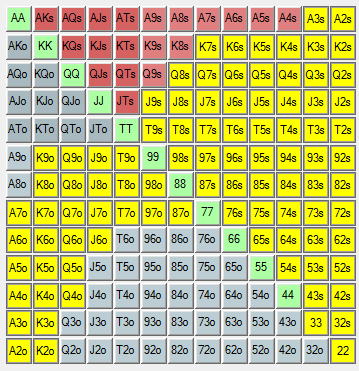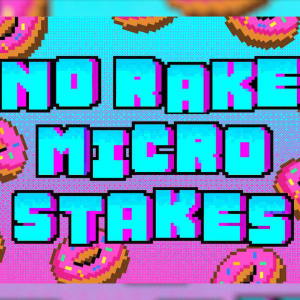Perhaps you’ve heard various poker players talking about “ranges”, but have no clue what they mean. Isn’t a range somewhere where you practice shooting rifles? As great as it’d be to put that latest suck-out guy on a literal shooting range, poker players typically mean something a little different.
you’ve heard various poker players talking about “ranges”, but have no clue what they mean. Isn’t a range somewhere where you practice shooting rifles? As great as it’d be to put that latest suck-out guy on a literal shooting range, poker players typically mean something a little different.
So, what is a range?
A range is a way of describing every possible hand our opponent might hold. The moment an opponent is dealt a hand, his range is going to be any one of the 1326 possible starting combinations. We could describe his range as “any 2 cards”.
Range = “The entire selection of possible hands our opponent might hold”
Lets suppose that player is a tight opponent and decides he wants to open-raise UTG. What is his range now? Well, which hands do we think he might be open-raising from that position? It’s very unlikely he has a hand like 72 offsuit, or even T9 offsuit. We could estimate his range was “any pocket pair and the bigger broadway cards”. If we wanted to write that range down it’d maybe look like this>>>
22+, AQo+, AJs+, KQs
This means our opponents range is: all pocket pairs above 22, all unsuited broadway hands AQo and above, all suited broadway cards AJs and above, and KQs.
But what if a looser player opens on the button - what kind of range might he have?
Probably most broadways, any pocket pair, a decent amount of suited connectors, including suited one-gappers, maybe some suited two-gappers, and some off-suit connectors:
Something like this:
22+, A2s+, K2s+, Q7s+
JTs - 54s, J9s - 75s, J8s - 96s
A2o+, K9o+, Q9o+, J9o+, T9o
Why are ranges even useful?
- Poker is a game of incomplete information: Obviously
 our opponent only has one of the hands in his range, not all of them. However, we don’t know exactly which hand he does have. If we knew that, the game would be easy.
our opponent only has one of the hands in his range, not all of them. However, we don’t know exactly which hand he does have. If we knew that, the game would be easy. - It's impossible to put opponents on an exact hand: The mistake many players make is trying to put their opponents on specific hands anyway, even though it is pretty much impossible. They see that tight player open from UTG and think something like “I bet he has AK”.
- Trying to guess an exact hand will lead to many mistakes: This is going to work really well the small percentage of the time the opponent really does have AK. The rest of the time you are going to end up making huge mistakes; trying to make sick hero calls with bottom pair because there is no Ace or King on the board.
- Range is king: In order to play consistently well against an opponent you need to make the play that works best against their entire range of possible hands. This is the foundation for taking your game to the next level. Perhaps you’ve seen some of your heroes like Ivey, Durrr, or Negreanu, make some really great, maybe even working out exactly what their opponent has. But then, those guys just have some mystical soul-reading ability right? Not at all, they are simply masters at putting players on a range, and then narrowing that range as the action continues.
Narrowing Ranges
The looser the player, the wider his range of possible hands is.
The more you know about a player and his tendencies, the easier it will be for you to assign that player a range. At first you can only make a rough guess about which types of hand you think they hold. As you learn more about their playing style you can be more and more specific.
As the hand proceeds you should attempt to narrow that range even further.
Example
Let’s suppose a tight player has this estimated UTG opening range:
22+, AQo+, AJs+, KQs
He decides to fire a continuation bet on 765 board after we call from the blinds. What is his range now, given that he cbet?
This is where the knowledge of your opponent comes in.
- Some players C-bet more often than others after all! Let’s assume we know this opponent will only bet with his strong hands. We can take 22-33, AJs+ AJo+, KQ, out of his range almost immediately. This leaves us with 44+ only. He doesn’t have 2-pair or a straight because these hands weren’t in his UTG opening range. He may or may not cbet 44, but he will definitely cbet 3-of-a-kind and overpairs.
- Let’s suppose the turn card is now the a. Should we be worried our opponent has hit this card? Almost never, in fact, it’s a very bad card for most of his range. (The only hands in our opponents range that don’t mind this Ace are 77,66,55,AA). If we’d attempted to put our opponent specifically on AK preflop we might mistakenly think he’d hit that turn card. Using a range-based approach we are able to deduce much more information about the strength of our opponents holdings.
- Let’s suppose our opponent now checks on this 765a board. What is his range now? It’s very likely he’d continue betting with 77,66,55,AA. We can narrow his range even further -44, 88-KK. If we are ahead of this range we should value-bet, if we are behind we can think about either bluffing or giving up. Since we know our opponent probably doesn’t like this Ace we can think about making big bets on the turn and river to get our opponent to fold.
Putting it Together
Don’t expect to become a master of ranges overnight, it takes many years of deliberate practice. For now you should focus on understanding how ranges work and why they are important.
It’s also useful to remember that ranges are just an estimate, albeit one that is as accurate as possible. Sometimes an opponent will still surprise you by showing up with a hand that you didn’t think was in their range.


